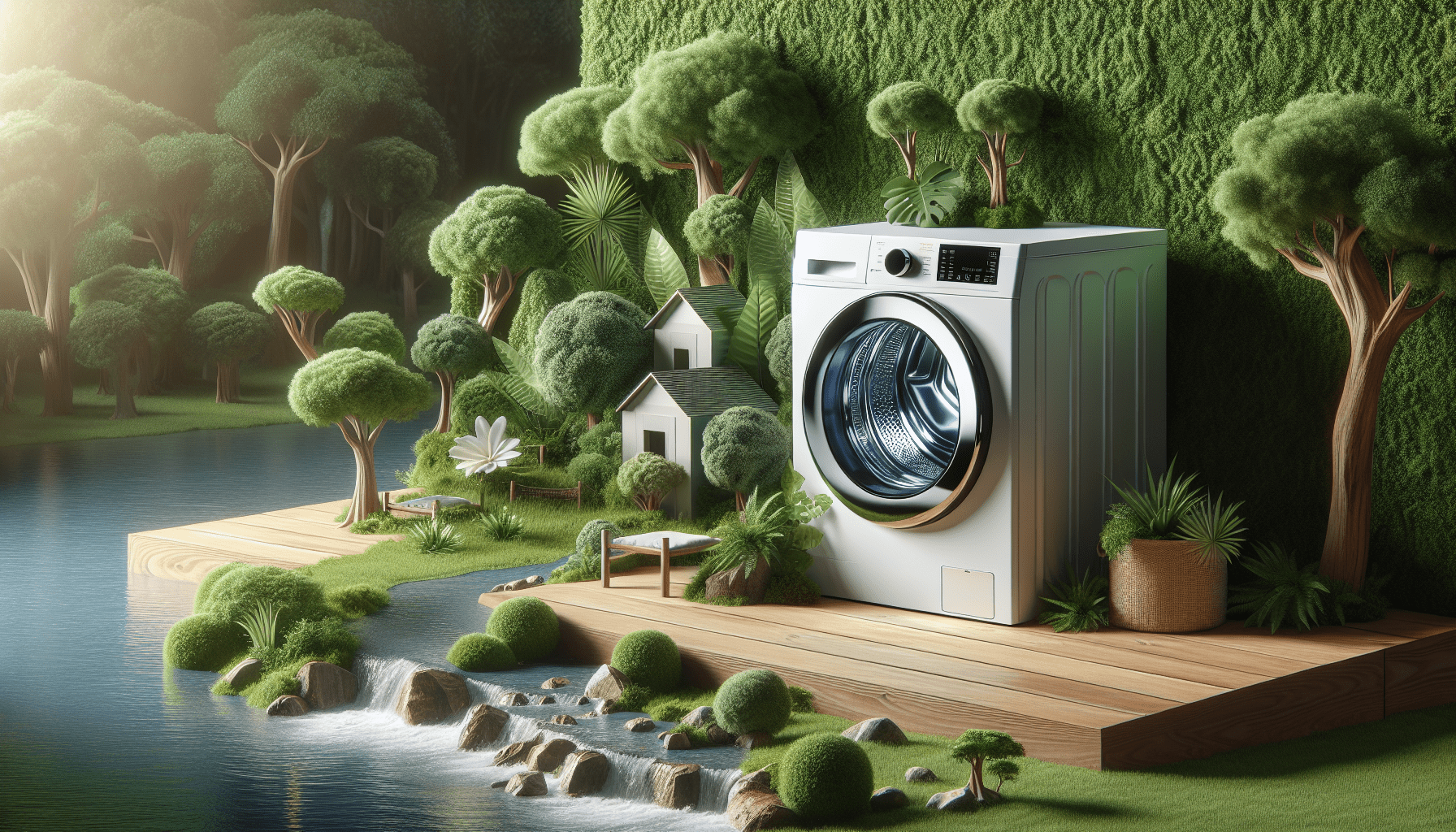Embarking on the journey towards a greener lifestyle can take many forms, and one significant step you can make is by selecting an eco-friendly laundry machine. In today’s environmentally conscious world, choosing appliances that help reduce your carbon footprint while still efficiently doing their job is more crucial than ever. This article will guide you through the essentials of picking out a laundry machine that not only meets your household needs but also aligns with your aspirations of living more sustainably. From understanding the latest energy-efficient technologies to evaluating water usage and determining the best features that support a greener planet, you’ll find everything you need to make an informed decision.
Understanding Eco-Friendly Laundry Machines
Choosing an eco-friendly laundry machine is not just about doing laundry; it’s about making a positive impact on the environment and possibly saving some money in the long run. Let’s dive into what makes a laundry machine eco-friendly, why it matters, and how it compares to standard models.
Definition of Eco-Friendly Laundry Machines
eco-friendly laundry machines are designed with both efficiency and the environment in mind. They aim to use less water, electricity, and detergent than their traditional counterparts, all while delivering the same, if not better, cleaning power. This means they have a lower overall impact on the planet, from the resources they consume to the waste they produce.
Importance of Eco-Friendly Appliances
The importance of eco-friendly appliances, including laundry machines, cannot be overstated. As concerns about global warming and water scarcity grow, each choice you make, including the appliances you use, plays a role in either contributing to or mitigating these environmental issues. Eco-friendly machines help in the latter, making them an important consideration for environmentally conscious individuals.
Difference between Standard and Eco-Friendly Laundry Machines
The main difference between standard and eco-friendly laundry machines lies in their efficiency and impact. Traditional models tend to use more water and energy, leading to higher utility bills and a bigger carbon footprint. Eco-friendly models, on the other hand, incorporate advanced technologies to minimize resource use without sacrificing performance.
Energy Efficiency
Energy efficiency is a crucial component of eco-friendly laundry machines, affecting both the environment and your wallet.
Energy Star Certification and Its Importance
Energy Star certification is a label earned by appliances that meet strict energy efficiency criteria set by the U.S. Environmental Protection Agency. An Energy Star-certified laundry machine uses significantly less energy than non-certified models, ensuring savings on electricity bills and a reduced environmental impact.
Comparing Energy Consumption Rates
When comparing energy consumption rates, eco-friendly machines often outperform standard ones by a significant margin. They utilize innovative features like efficient motors and improved insulation to reduce energy demand, making them more sustainable and cost-effective in the long run.
How Energy Efficiency Reduces Carbon Footprint
Energy efficiency directly reduces your carbon footprint by decreasing the amount of electricity needed for laundry. Since much of the electricity is still generated from fossil fuels, using less energy means releasing fewer greenhouse gases into the atmosphere, contributing to the fight against climate change.
Water Usage
Water usage is another critical factor where eco-friendly laundry machines shine, conserving this precious resource while getting your clothes clean.
How Eco-Friendly Machines Save Water
Eco-friendly machines save water through advanced design features like low-flow outlets and recirculation systems, which use water more efficiently. Some models can detect the size of the load and adjust the water usage accordingly, ensuring no excess water is wasted.
Importance of Low Water Usage in Laundry Appliances
The importance of low water usage extends beyond just personal savings. It also plays a significant role in water conservation efforts, particularly in regions facing water scarcity issues. By choosing appliances that use less water, you’re not only reducing your utility bills but also helping to conserve a vital environmental resource.
Measuring and Comparing Water Efficiency
To measure and compare water efficiency, look at the number of gallons per cycle each machine uses. Eco-friendly models often boast significantly lower water usage compared to standard machines, with some of the most efficient models using less than half the water of older or less efficient versions.
Detergent Usage
Eco-friendly laundry machines also innovate in the realm of detergent usage, promoting more sustainable laundry practices.
Compatibility with High-Efficiency (HE) Detergents
These machines are often compatible with HE detergents, which are concentrated formulas designed for low water usage. Using HE detergents means you need less detergent for each load, reducing the chemical footprint of your laundry and the need for more frequent purchases.
Reducing Detergent Usage and Its Environmental Impact
By reducing detergent usage, eco-friendly machines not only save you money but also minimize the harmful chemicals released into the environment. Less detergent means fewer pollutants in waterways, contributing to healthier ecosystems and less strain on water treatment facilities.
Alternative Eco-Friendly Cleaning Agents
For those looking to further reduce their environmental impact, eco-friendly machines are also compatible with alternative cleaning agents like soap nuts or baking soda. These natural options offer effective cleaning without the harsh chemicals found in traditional detergents, further enhancing the sustainability of your laundry routine.
Wash Performance
With all these efficiency improvements, one might wonder if eco-friendly machines compromise on wash performance. Let’s see how they stack up.
Balancing Efficiency with Cleaning Power
Eco-friendly laundry machines strike a balance between efficiency and cleaning power through advanced technologies. Features like improved drum movements and smarter wash cycles ensure clothes come out clean, even with less water and energy.
Innovative Technologies for Better Wash Performance
Manufacturers incorporate innovative technologies such as steam cleaning and variable spin speeds to boost wash performance. These features tackle tough stains and dirt effectively, proving that you can achieve excellent results in a more sustainable way.
Evaluating Performance through Consumer Reports and Reviews
To gauge real-world performance, it’s helpful to consult consumer reports and reviews. These can provide insights into how eco-friendly machines perform across different brands and models, helping you make an informed decision based on both efficiency and effectiveness.
Durability and Longevity
The sustainability of an appliance isn’t just about its operational efficiency; it also includes its lifespan and the environmental impact of its production and disposal.
How Long-lasting Machines Reduce Waste
Long-lasting machines reduce waste by staying out of landfills longer. When you choose a durable, eco-friendly model, you’re not just getting an appliance that uses resources efficiently; you’re also contributing less to electronic waste.
Materials and Construction of Eco-Friendly Models
Eco-friendly laundry machines often utilize materials and construction techniques that are both durable and sustainable. This might include the use of recycled or recyclable materials, reinforcing the environmental ethos driving their design.
Warranty and Repair Options
A good warranty and accessible repair options extend the life of an appliance. Eco-friendly machines that come with comprehensive warranties and support a repair-over-replace philosophy further their sustainability by ensuring they last as long as possible.
Size and Capacity
Selecting the right size and capacity for your needs is crucial for maximizing efficiency and minimizing waste.
Selecting the Right Size for Your Needs
Choosing a machine that fits your household’s needs prevents overuse of water and energy. A smaller household might opt for a compact model, while a larger family might need a machine with a larger capacity to minimize the number of loads.
Implications of Machine Size on Energy and Water Consumption
The size of the machine directly impacts energy and water consumption. A larger machine requires more of both, so selecting the size that matches your actual needs can avoid unnecessary waste.
Benefits of Adjustable Capacity Features
Some eco-friendly models offer adjustable capacity features, allowing the machine to adapt to different load sizes. This ensures that whether you’re washing a small load or a large one, the machine operates as efficiently as possible.
Smart Features
Smart features in eco-friendly machines offer convenience while enhancing efficiency.
How Smart Technologies Enhance Efficiency
Smart technologies, such as Wi-Fi connectivity and app integration, allow for remote monitoring and control. This means you can optimize usage times based on energy rates or monitor water and energy consumption directly from your smartphone.
Remote Monitoring and Control via Apps
With apps, you can start, stop, or pause cycles remotely, receive notifications about maintenance needs, and even track savings over time. This level of control and insight encourages more efficient use of the machine.
Integration with Home Energy Management Systems
Some eco-friendly machines can integrate with home energy management systems, allowing for an even more optimized and eco-friendly home. This integration can help ensure that your laundry habits contribute to overall household energy savings and sustainability goals.
Price and Affordability
The upfront cost of eco-friendly laundry machines can be higher than traditional models, but it’s important to consider the long-term picture.
Cost Comparisons Between Traditional and Eco-Friendly Machines
While eco-friendly models may have a higher initial price tag, they often result in savings over time due to reduced utility costs. The difference in upfront cost can be offset by the savings in water, energy, and detergent.
Calculating Long-term Savings
To truly understand the affordability of an eco-friendly machine, calculate the long-term savings. This includes lower monthly utility bills, less frequent detergent purchases, and the potential longevity of a more durable machine.
Incentives and Rebates for Eco-Friendly Appliance Purchases
Look out for incentives and rebates offered by manufacturers, retailers, or government programs. These can significantly reduce the initial cost of purchasing an eco-friendly laundry machine, making it an even more attractive investment.
Making the Purchase
When you’re ready to buy an eco-friendly laundry machine, there are a few final steps to ensure you make the best choice for your needs.
Where to Buy Eco-Friendly Laundry Machines
Eco-friendly laundry machines are available from many retailers, both in-store and online. Consider purchasing from retailers known for their commitment to sustainable practices or those offering recycling programs for your old appliance.
Questions to Ask Retailers
When shopping, ask retailers about the machine’s energy and water efficiency, compatibility with HE detergents, and any smart features. Inquire about warranties, service plans, and the availability of parts for repair.
Final Checklist Before Making a Purchase
Before making your purchase, review this checklist: Confirm the machine’s size and capacity match your needs, ensure it has the energy and water efficiency ratings you desire, check for smart features and compatibility with your home energy systems, and investigate available incentives or rebates. Making an informed decision will ensure your eco-friendly laundry machine meets your environmental goals and lifestyle needs, offering a sustainable solution for years to come.



